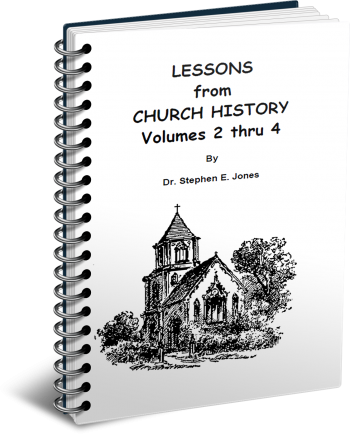Latest Posts
View the latest posts in an easy-to-read list format, with filtering options.

Volumes 2-4. This is the history of the Church from the Roman War (66-73 A.D.) to Constantine and the Council of Nicea in 325 A.D. with lessons to be learned from it.
Category - History and Prophecy

As I wrote earlier, the Roman bishop, Pontian, was able to reconcile with Hippolytus in 235 and resolve the schism while the two bishops were condemned to work side by side in the Sardinian mines. When Pontian learned that he was to go into exile, he resigned the bishopric in order not to leave his people leaderless in Rome, and Anteros filled his position for a month before dying.
It happened then that an earnest believer in the countryside named Fabian had come to the city to visit the church. Eusebius reports in Eccl. Hist., VI, xxix,
“When the brethren had all assembled with the intention of electing a successor to the bishopric, and a large number of eminent and distinguished men were in the thoughts of most, Fabian, who was present, came into no one's mind. But suddenly out of the blue a dove fluttered down and perched on his head (the story goes on), plainly following the example of the descent upon the Saviour of the Holy Spirit in the form of a dove. At this, as if moved by one divine inspiration, with the utmost enthusiasm and complete unanimity, the whole meeting shouted that he was the man, and then and there seized him and set him on the bishop's throne.”
No doubt this helped to secure the unity of the Roman church, for a sign like this was surely accepted by both groups as a divine endorsement. He remained bishop of Rome from 238-249 through the reign of Philip, the first Christian Emperor of Rome.
As I wrote earlier, the Roman Emperor, Philip the Arabian, ruled from 244-249 and became a Christian during that time. Decius, his successor (249-251), hated Philip, and so he persecuted the Christians viciously in the two years of his reign. Fabian was martyred in January of 250 and after a 14-month interim was succeeded by Cornelius.
In the same persecution, Alexander, the bishop of Jerusalem also gave confession of his faith before the governor's court at Caesarea and died in prison at a ripe old age. The bishop of Antioch, Babylas also died in prison under Decius. It was in this persecution that Origen was also arrested and tortured horribly in the attempt to get him to deny the faith. Fortunately for him, however, Decius died the next year, and Origen's prison guards allowed him to escape, having been impressed with his testimony and kindly manner. Origen never recovered from his injuries, but he died peacefully in the city of Tyre two years later in 253 and received an honorable burial from Methodius, the bishop of Tyre.
The Church in Antioch suffered greatly from the Decian persecution. Dionysius, bishop of Alexandria, wrote a letter to Fabius, a later bishop of Antioch, about this persecution, and Eusebius quotes from it in Eccl. Hist. VI, 41,
“First, they seized an old man named Metras, and ordered him to utter blasphemous words; when he refused, they beat him with cudgels, drove pointed reeds into his face and eyes, took him to the suburbs, and stoned him to death.
“Next, they took a female convert named Quintas to the idol's temple and tried to make her worship. When she turned her back in disgust, they tied her feet and dragged her right through the city over the rough paved road, bumping her on the great stones and beating her as they went, till they arrived at the same place, where they stoned her to death.
“The Christians retired and gradually withdrew; like those to whom Paul paid tribute, they took with cheerfulness the plundering of their belongings. I do not know of anyone, except possibly one man who fell into their clutches, who up to now has denied the Lord.
“Next they seized the wonderful old lady Apollonia, battered her till they knocked out all her teeth, built a pyre in front of the city, and threatened to burn her alive unless she repeated after them their heathen incantations. She asked for a breathing space, and when they released her, jumped without hesitation into the fire and was burnt to ashes.”
These are just a few of the examples in this lengthy report quoted by Eusebius.
But some of the Christians denied Christ in the persecution. Out of this persecution came a new Church controversy about how to treat these Christians who had denied Christ in the face of torture and threats. Novatus, a presbyter in the Roman Church, took a very dim view of these “lapsed” Christians. Eusebius says Novatus . . .
“regarded them with lofty contempt; there was no hope of salvation for them now, even if they did everything in their power to prove their conversion sincere and their confession wholehearted. So he set himself up as leader of a new sect, whose members in the pride of their hearts entitled themselves the ‘Pure’.”
A synod was convened in Rome to deal with this new controversy, attended by 60 bishops and many presbyters and deacons. Eusebius continues,
“The result was a unanimous decree that Novatus, his companions in presumption, and any who thought fit to approve his attitude of hatred and inhumanity to brother-Christians, should be regarded as outside the Church, but that those brothers who had had the misfortune to fall should be treated and cured with the medicine of repentance.”
I suspect that part of synod's discussion included Peter's denial of Christ three times, and then his subsequent repentance and Christian witness.
Bishop Cornelius wrote to Fabius of Antioch a letter to say that Novatus had long had the ambition of becoming a bishop. The account says that he tricked three “simple-minded” bishops into coming for a visit to Rome, and then was able to get them drunk. While drunk, “he forcibly compelled them to make him a bishop.” One of the three bishops in question later repented and asked for forgiveness, telling the story.
Those who followed Novatus were forced to swear an oath of allegiance to him before being given communion: “Swear to me by the Blood and Body of the Lord Jesus Christ never to desert me and turn to Cornelius.” (Note Matt. 5:33-37, where Jesus says not to swear at all.) This, of course, made it doubly difficult to leave Novatus and return to the regular congregation in Rome that was led by Cornelius.
The underlying problem was that Novatus was angry when Cornelius was elected bishop instead of him. His predecessor, Fabian, had been martyred by Decius on January 21, 250, and for a time there was a vacancy, because they felt it wise not to put anyone in danger by electing him as the next bishop. After 14 months, the vacancy was finally filled by the election of Cornelius in March of 251. But during the vacancy, Novatus served as an interim official in Rome to carry on the correspondence with the other bishops. The election of the unknown Cornelius angered him, and so he found an excuse to break away and form his own church.
Novatus is thus known as the second “anti-pope” (after Hippolytus). The schism was felt throughout the Church, however, for each side appealed to foreign bishops. Some agreed with Novatus that the Christ-deniers had forfeited their salvation forever, but most agreed with Cornelius. And so the second-century Church seemed to be characterized by conflicts between those who espoused Holiness, and those who espoused Grace.
The next controversy to be resolved was whether or not to recognize the baptism performed by Novatian clergy. Some felt that the validity of baptism had more to do with the faith of the one being baptized; others, however, put more emphasis upon the Church itself and its authority to grant salvation by baptism. Here is where the view of Cyprian of Carthage became important, for it established the Church authority to grant salvation. It put the Church into the position of determining who was and who was not a Christian, according to his relationship to the Church, rather than to his relationship with Jesus Christ.
Perhaps it was this issue, more than any other, which usurped the authority of Christ as High Priest. This is the heart of the definition of Antichrist.